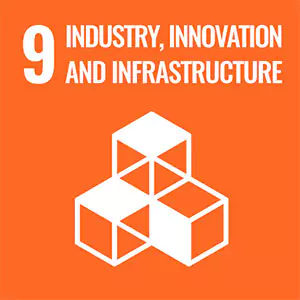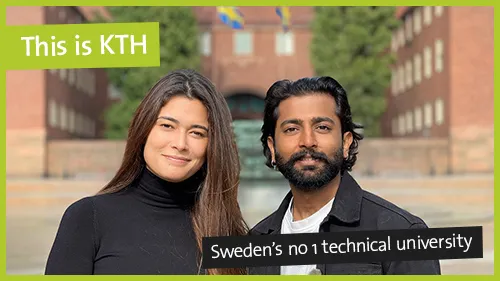MSc ICT Innovation KTH
The master's programme ICT Innovation combines technical competencies with skills in innovation and entrepreneurship. The programme strongly focuses on integrating education, research, and business modules in its curriculum, with active industry involvement. Students choose one of six technical specialisation tracks. Graduates work in system and software development, product management, business development, start-ups, and consulting.

ICT Innovation at KTH
The main subjects of the master's programme in ICT Innovation are Computer Science and Electrical Engineering. The programme combines advanced technical education in information and communication technology (90 ECTS) with business-oriented courses focusing on innovation and entrepreneurship (30 ECTS).
The Innovation and Entrepreneurship (I&E) education within the ICT Innovation master’s programme equips future ICT engineers with an entrepreneurial mindset to support digital transformation. The I&E courses are compulsory for all students in the programme, regardless of their selected track.
The programme offers five tracks that provide further technical specialisation:
Autonomous Systems
The Autonomous Systems track combines computer science and mechatronics engineering. It is well aligned with market demand in the automobile, manufacturing, logistics, shipping, mining, and recycling industries. Autonomous software systems are also widely used in application areas such as media, finance, customer service, and healthcare.
Data Science
The Data Science track concerns methods and technology for collecting, organising and analysing data to generate new knowledge. This includes implementing and applying machine learning algorithms, platforms for distributed handling of extensive data, large-scale machine learning, algorithms and systems for descriptive and predictive modelling, including the analysis of complex data such as networks, text and images.
Visual Computing and Communication
The Visual Computing and Communication track combines computer science and information technology in image processing and communication, image analysis, computer vision, computer graphics, augmented reality, visualisation, visual analytics, and web-based and network applications.
Human Computer Interaction and Design
The Human-Computer Interaction and Design track takes an interdisciplinary user-centred design approach. It combines human aspects (cognitive, aesthetic, and sensory-motor levels) with technological and business aspects to create new products and services with great usability and user experience, according to customer demand.
Cloud and Network Infrastructures and HPC
The Cloud and Network Infrastructures and HPC track covers the design, management, and operation of communication networks, as well as HPC, cloud services, deployment models, and application development. The track also addresses future directions of cloud computing, for example, in the fields of edge and fog computing as well as blockchains and distributed ledger applications.
A key component in all specialisations of ICT Innovation is the integrated combination of a master’s degree project (30 ECTS), an “internship” (which should be included in the degree project credits) and an I&E project (6 ECTS). The industry-based degree project (typically integrated with the "internship") is well integrated with the I&E minor and technical majors.
The programme covers two years of study at KTH in Stockholm. However, students who would like to attend the second year of the programme abroad can do so under the EIT Digital scheme, which is attached to this programme. This creates flexibility for students who would like to continue their second year on the programme by either staying at KTH or deciding to do the second year abroad at one of the other EIT Digital member universities.
This is a two-year programme (120 ECTS credits) given in English. Graduates are awarded the degree of Master of Science, with a major in Electrical Engineering or Computer Science and Engineering. The programme is provided at KTH Campus by the School of Electrical Engineering and Computer Science (at KTH).
For details about the joint EIT Digital program please see EIT Digital Master School .
Courses in the programme
The courses in the programme cover topics such as marketing and market analysis, business formation, project work and management, and advanced ICT.
Courses in the programme ICT Innovation
Future and career
With the business-oriented focus combined with the technical specialisation, you will find a plethora of job and career opportunities. Examples include innovative start-ups, research-driven organisations and advanced IT businesses worldwide. The programme works closely with various top-tier companies to connect and prepare you for your future career. Throughout the programme, you will also interact with many of these businesses and industry partners, for example, by conducting your master’s degree project with them on real-life projects. In addition to improving students' cultural and language skills, this experience will give them expertise in their chosen technological field and excellent qualifications for managerial posts in global markets.
Sustainable development
Graduates from KTH have the knowledge and tools for moving society in a more sustainable direction, as sustainable development is an integral part of all programmes. The three key sustainable development goals addressed by the master's programme in ICT Innovation are:



Overall, digitalisation can significantly contribute to sustainable development by promoting more efficient resource use and enhancing everyday life. The programme provides a foundation for sustainable development in engineering, along with more specific knowledge about digital innovation systems that support decent work conditions and economic growth, aiming to create a more sustainable industry and infrastructure for cities and communities.
Faculty and research
We have a broad group of teachers who are also active in different research areas represented by the different tracks.




